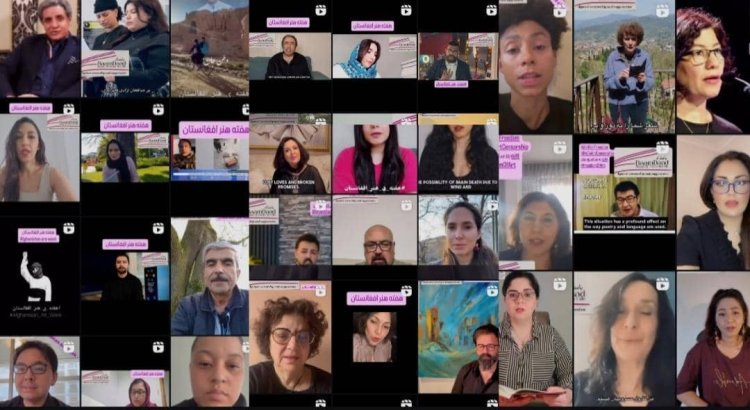Afghanistan Art Week: A Protest Against Cultural Repression and Censorship

In response to the growing repression of art and artists by the Taliban, Afghan cultural and social activists launched a campaign titled Afghanistan Art Week. The initiative began on April 15, coinciding with World Art Day, and continued for a week. It was organized by Baamdaad – House of Poetry in Exile.
Somaia Ramish, a poet, social activist, and head of the organization, invited Afghan artists both inside and outside the country to join the campaign by sharing a piece of their art. In a video message, she emphasized that even in Afghanistan’s darkest moments, art continues to serve as a powerful tool for protest and advocacy.
"Let us resist the ban on art by sharing our artistic and cultural values," she said. "You can recommend a book, hum a song, write an article, recite a poem, or take a photograph. All of these are acts of resistance."
Many Afghan writers, poets, and prominent cultural figures such as Wajiha Rastagar, Shakeeb Mosadeq, Wahab Mojir, Arash Barez, Khalid Nawisa, Farida Tarana, Asef Hossaini, Rahna Solimani, Baran Sajadi, Sahra Karimi, Yaqob Yasna, Samandar Wafa and many more joined the campaign. Artists from Iran, the Netherlands, France, and Japan also expressed solidarity by sharing their work.
World Art Day in the Shadow of Repression
Since the return of the Taliban to power, artistic expression in Afghanistan has faced unprecedented restrictions: from the censorship of books and the banning of music and images of living beings to the burning and destruction of artworks. Writers and artists are grappling with a pervasive cultural suffocation.
Book Censorship and Confiscation
Through a "Book Review Commission" established within the Ministry of Information and Culture, the Taliban has institutionalized the censorship and confiscation of books. The commission has issued lists of banned titles in areas such as history, politics, religion, literature, and art. Taliban officials conduct regular inspections of bookstores, seizing any titles deemed contrary to their ideologies. Booksellers who violate these orders risk fines or imprisonment.
In November 2024, Taliban forces distributed a list to booksellers in Kabul banning the sale of around 400 books. According to booksellers, the list included works on Shi’a Islam, modern governance, sociology, political figures like Ahmad Shah Massoud, democracy and political freedoms, novels, poetry, and even books on art and painting. At the Islam Qala border, books imported from Iran are inspected and often seized by Taliban.
The Taliban has removed thousands of books from libraries across Kabul, Herat, Balkh, Kandahar, Ghor, Baghlan, and other provinces, labeling them “incompatible with Islamic and national values."
Ban on Depictions of Living Beings
The Taliban’s ban on depictions of living beings—based on Article 17 of the “Promotion of Virtue and Prevention of Vice” law (Amr bil Ma’ruf wa Nahi an al-Munkar) has devastated visual arts such as photography, filmmaking, painting, and digital art. Many artists have been forced to remove their work from public platforms or continue their practice in silence and privacy.
This policy even extends to book covers. Publishers and booksellers have been instructed to conceal any images of living creatures on books. At art exhibitions and book fairs, such images are removed or hidden. The publication of human and animal imagery in media and public spaces has also been prohibited, a rule now enforced in 14 provinces.
Destruction of Instruments and Ban on Music
Music has also been severely impacted by the Taliban’s cultural policy. This group has banned playing and listening to music, labeling it a source of “moral corruption.” From the early months of its return to power, the Taliban has repeatedly broken or burned musical instruments in public.
On July 29, 2023, the Ministry for the Promotion of Virtue and Prevention of Vice in Herat burned musical instruments worth thousands of dollars. Two days later in Badakhshan, authorities of the same ministry confiscated dozens of USB drives containing music, from vehicles, warning drivers not to listen to music. Earlier reports indicated that Taliban forces entered wedding halls in Kabul and stopped music from being played
A Literary Scene in Isolation
Literary circles that once flourished in major Afghan cities have dwindled. Many writers have emigrated or ceased publishing their work for fear of censorship and persecution. Intense control over cultural content in media, public spaces, and educational institutions has virtually shut down the free flow of ideas and cultural dialogue.
Cultural activists and artists warn that the Taliban is actively working to extinguish creativity and resistance by imposing a suffocating cultural regime. They see the current restrictions as part of a deliberate campaign to eliminate freedom of expression, creativity, and cultural diversity in Afghanistan.
